Candidates for Illinois governor are split over marijuana legalization despite popular support
October 25, 2018
In supporting marijuana legalization, Illinois gubernatorial challenger J.B. Pritzker could usher in a change that affects everything from criminal justice to public health to the economy if he’s elected.
In taking a decidedly more skeptical view, incumbent Gov. Bruce Rauner may appeal to his base while — like his stance on his opponent’s graduated income tax idea — finding himself on the less popular side of the issue.
With polls indicating that the Democratic Pritzker is favored — and other surveys suggesting wide support for adopting a recreational pot law — his election could put Illinois on the fast track to becoming one of the first Midwestern states to legalize cannabis.
Advertisement
The Republican Rauner, by contrast, has said before that he’s “very much opposed” to legal marijuana.
His campaign elaborated this week, issuing a statement that legalization “is a much newer and more complex issue that should not be considered by the state of Illinois until all possible positive and negative effects are understood.”
The challenger says legal cannabis could generate an estimated $350 million to $700 million in annual taxes, echoing what sponsors have touted about a pending legalization bill. Pritzker also says the change would increase safety for people who use the drug and improve racial justice, since minorities are disproportionately arrested for marijuana possession. And the nominee says he would make sure minorities are involved in helping run the new industry.
“J.B. knows we can legalize marijuana in a safe way that will benefit communities across Illinois and he is ready to do that as governor,” his campaign told the Tribune.
The governor, however, has cited concerns about the impact on public health and safety, like increased emergency room visits and drugged driving arrests in states with legal pot, along with increased substance abuse. Rauner says states that allow it are conducting a massive “human experiment.”
It’s not clear whether their starkly different stances on the issue alone will swing the Nov. 6 election.
But marijuana supporters like Dan Linn, who heads the Illinois chapter of the marijuana law reform group NORML, expect the issue to give Pritzker a bump at the polls, particularly among younger voters.
Advertisement*
“It’s going to be part of a broader wave of young people going to the polls,” Linn said. “When there’s such an obvious difference between the two major party candidates, this issue will cause a lot of younger people to support the Democrat.”
Nine states have legalized pot, all by voters approving ballot questions. Illinois doesn’t provide for the same binding referendums as some other states, so it’s up to lawmakers to decide the issue. Traditionally, many politicians have opposed legalization as part of a broader tough-on-crime agenda. But public opinion nationwide has shifted, in part because of the perception that the drug is less harmful than legal substances like alcohol, tobacco or prescription drugs.
In Illinois, almost two-thirds of respondents statewide supported legalization, according to polls conducted each of the past two years by the Paul Simon Public Policy Institute at Southern Illinois University. That was backed up by a similar ratio of voters who supported legalization in an advisory referendum held in Cook County in March.
Also, Canada recently became the second country, after Uruguay, to make pot legal nationwide.
In the U.S., cannabis remains illegal at the federal level, but prosecutors generally have not gone after people complying with state programs. President Donald Trump has said he probably will support a bill to ease the federal ban and let states decide the issue.
Since late 2015, Illinois has allowed sales of cannabis for medical use, which was approved under Rauner’s predecessor, Democratic Gov. Pat Quinn. The law was one of the strictest of its kind in the nation, limiting use to patients certified by doctors as having one of about 40 conditions such as cancer, spinal disease or fibromyalgia.
The Rauner administration initially rejected efforts to add other conditions to the list, though the governor did support adding terminal illness and post-traumatic stress disorder in 2016. This August, Rauner signed a bill that allows marijuana to be used in place of prescription opioids and that eases access for all prospective patients by eliminating requirements for fingerprints and background checks.
The changes are expected to expand greatly the program beyond its current, relatively small size, with 46,000 certified patients and $12 million in monthly sales. But if legalization comes next year, as proposed, it would make Illinois one of one of the largest potential markets in the nation.
Voters in at least four states will see marijuana ballot questions this fall. Michigan and North Dakota will vote on legalization, while Missouri and Utah voters will take up the question of allowing the drug for medical uses. Sixteen counties in Wisconsin also plan to hold advisory ballot questions on legalization.
Yet there’s a reason commercials haven’t filled television with images of pot smokers. Experts say marijuana alone is unlikely to determine the election.
Though the issue typically favors Democrats, who more often support legalization, some research indicates it doesn’t necessarily drive turnout and that voters often identify other issues as higher priorities, like crime and taxes.
While Colorado saw a bump in turnout among young voters for its legalization referendum in 2012, there’s little evidence of that in other elections, according to Felicia Sullivan, senior researcher at the Center for Information and Research on Civic Learning and Engagement at Tufts University.
“The issue alone doesn’t really turn out young people,” she said.
Campaigns typically focus more on established, middle-aged voters, she added. And while younger voters tend to support legalization more often, now a majority of voters over 55 do as well.
Some special interest groups are trying to make legalization a voting issue. The Coalition for a Safer Illinois called for voters to end “the wasteful and cruel policy of prohibition.” The message was signed by Chris Lindsey, senior legislative counsel for the Marijuana Policy Project.
The project, which lobbies for legalization, has spent about $1.6 million on lobbying this year, more than ever before, according to the nonpartisan Center for Responsive Politics, a watchdog group. But Lindsey said the group is concentrating efforts more on other states with ballot questions.
Lavon Pettis, director of Healthy and Productive Illinois, which opposes legalization, said concerns about racial injustice were initially addressed by decriminalization of small amounts of the drug in Illinois in 2016, and should be further addressed by changes in policing.
And she expects any tax windfall from marijuana to be offset by increased societal costs for things like driving under the influence, substance abuse and failed workplace drug tests.
“Marijuana is playing a major role in the Illinois election right now,” she said. “They’re trying to bandwagon off something they think is cool. But no one is talking about the costs.”
(c)2018 the Chicago Tribune
Visit the Chicago Tribune at www.chicagotribune.com
Distributed by Tribune Content Agency, LLC.
Advertisement









